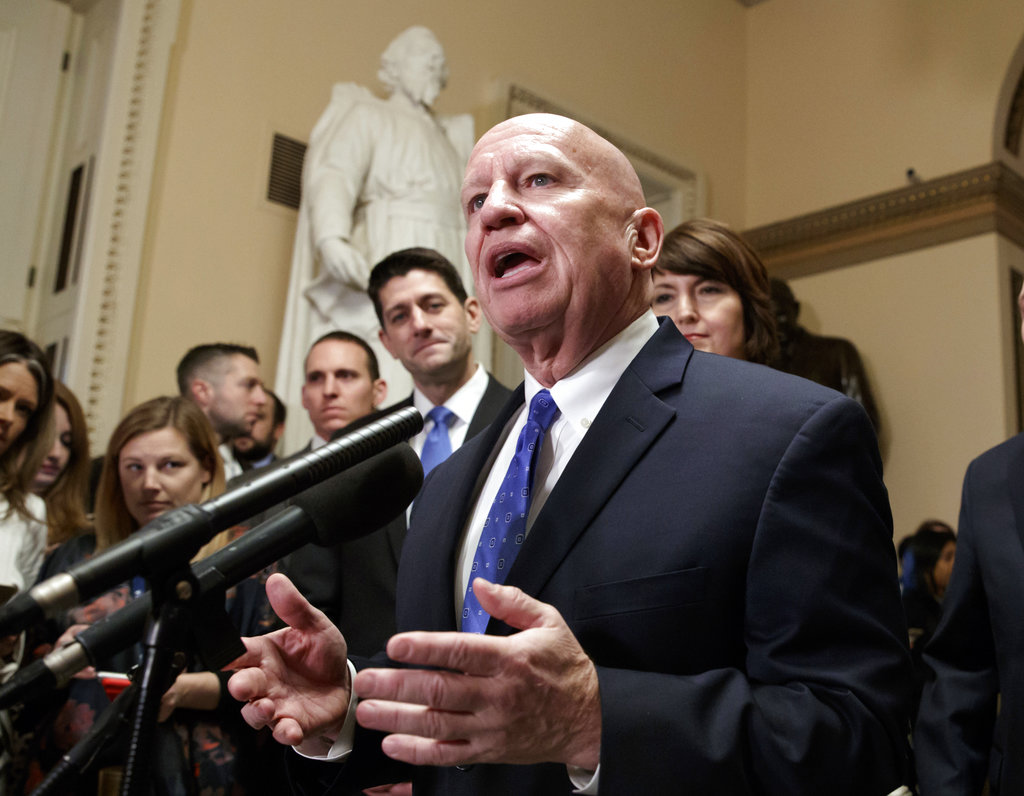This month, Rep. Kevin Brady (R-TX) and staff have been combing through years of memories, troves of photos, and reams of paperwork documenting both the highs and lows of his congressional career, which has spanned more than a quarter of a century.
Since 1997, Brady has represented Texas’s 8th Congressional District, covering the northern and western Houston exurbs. For 18 of those years, House Republicans held the majority, while for eight years, including the last four, they’ve been in the minority, which amounts to playing legislative defense on a daily basis.
Brady won’t be part of the new House Republican majority that will take control of the chamber on Jan. 3 because he’s retiring at the end of the current congressional session. But in a career with legislative highlights such as shepherding into law then-President Donald Trump’s signature domestic achievement, the Tax Cuts and Jobs Act of 2017, Brady is departing Capitol Hill feeling, more than anything, a sense of gratitude.
“It’s bittersweet in the sense that I do really love this job and who I work with and the issues, but I know it is time to go,” Brady told the Washington Examiner during an interview. “I’m really blessed. So few people get an opportunity to serve in Congress.”
And cleaning out his congressional office has sparked more than a tinge of nostalgia, said Brady, 67.
“It became very real here this last month,” Brady said. “I’ve been archiving our documents and papers for months and months, but closing down your office here in Washington, going through 26 years of photos and personal notes and memories — those are pretty powerful moments.”
High-profile committee chairman
Brady’s rise to the peak of his congressional influence as chairman of the tax-writing House Ways and Means Committee happened about 14 months before Trump’s inauguration as president. Brady succeeded then-Rep. Paul Ryan, who ascended to House speaker in fall 2015.
Brady was a key architect of the Tax Cuts and Jobs Act of 2017, which was the single biggest change to the U.S. tax code in decades. The law is perhaps best known for lowering the corporate tax rate from 35% to 21%. It also implemented a wide range of changes to individual taxes, including lowered tax rates, a larger child tax credit, and a nearly doubled standard deduction.

That influential Capitol Hill perch is a long way from Brady’s hometown of Vermillion, South Dakota, which had just 5,000 people when he was born. Brady and his four siblings were forced to deal with a searing family tragedy. Their father, William, an attorney, was murdered in a courtroom shooting while representing a client in a divorce settlement. Brady credits his mother with holding the family together emotionally and financially.
Vermillion is home to the University of South Dakota, from which he graduated with a degree in mass communications. Brady went on to work for the Rapid City-area Chamber of Commerce before moving to Texas in 1982 and working for the Beaumont Chamber of Commerce. Brady’s political career began to take off after he was elected to the Texas House of Representatives in 1990 and Congress six years later.
When Brady was first sworn into Congress in January 1997, he hoped to use his position to expand economic freedom both for people and businesses, he said. And for the most part, Brady added, he has succeeded in that goal, particularly through tax reform. While Democrats ripped the “Trump tax scam” as a deficit-buster and corporate giveaway, Brady said that over five years, it has not only helped unleash America’s economic potential but changed the very trajectory of American life.
“You saw household income surge more in one year, 2019, than all eight years of the Obama-Biden administration combined,” Brady said. “You saw income inequality begin to shrink, and 6 million Americans were lifted out of poverty.”
President Joe Biden’s defeat of Trump gave Democrats full control of the federal government. House Democrats’ sweeping 2018 victories had already demoted Brady to ranking Republican member on the House Ways and Means Committee. He and panel GOP colleagues have devoted these past two years to defending the sweeping 2017 tax cut law.
And they’ve been able to thwart some Democratic efforts at scaling back and even repealing it. For instance, there was a plan to raise the headline corporate tax rate from 21% to 28%, a pitch to increase the top marginal tax rate on those making over $400,000 per year to 39.6%, and a proposal to eliminate the “step-up in basis” at death for capital gains above $1 million per person or $2.5 million per couple, among other Biden administration and congressional Democratic proposals that never succeeded.
“For the most part, I would say the vast bulk, 95% perhaps or higher, of the Trump tax cuts stayed in place, and that was a coordinated, diligent, persistent fight on our part,” Brady said about unified GOP opposition to such changes.
Brady is also proud of his track record on free trade, something he devoted most of his 26 years to expanding. He said being able to buy, sell, and compete anywhere in the world with as little government interference as possible is at the heart of the free enterprise system. Brady himself has helped secure the passage of more than a dozen of the country’s free trade agreements during his time in office, including the USMCA trade deal with Mexico and Canada that supplanted NAFTA.
And Brady was known for being open to work across the aisle throughout his time in the House and as the leader of Ways and Means, even despite preserving conservative bona fides (he maintains a lifetime American Conservative Union rating of 92 out of 100 and has been rated above 80 all of the past five years).
Brady said that just one example of this principled cooperation was working with Rep. John Lewis and others to pass the Taxpayer First Act, bipartisan legislation that introduced IRS reforms and was signed into law by Trump in 2019.
“I’m proud of the bipartisan work because I feel like those were conservative wins as well,” Brady said.
Congressional Baseball Game stalwart
Brady’s competitive spirit has been on display in the annual Congressional Baseball Game. Brady has played for the Republican team against its Democratic rival almost every year since joining the House in 1997.
Outside of congressional successes, Brady’s most cherished achievement in life has been building his family. He and his wife Cathy live in The Woodlands, Texas, which is located just outside of the Houston metropolitan area. The two have two adult children who both live close to home — Will, 24, is a crew foreman and welder for a family-owned business in Magnolia, and Sean, 21, works in the healthcare and restaurant industries in The Woodlands.

“I think, obviously, that is my greatest achievement,” Brady said of his family.
Not that everything has gone smoothly for Brady during his congressional career. In November 2005, Brady pleaded no contest to a drunken driving charge in his home state of South Dakota. He was convicted and fined $350. Brady’s arrest came after he attended a homecoming-weekend cocktail reception and dinner at the University of South Dakota.
Looking forward
With House Republicans about to take the majority, Brady said they have a short window for legislative accomplishment before 2024 presidential politics kick in.
“We’ve got a year as Republicans and conservatives to show America what a country that is on the right track would mean for them,” he said.
Speaking of 2024, Brady is careful to tread above the political maelstrom that is the presidential primaries. Trump has already thrown his hat into the ring, but an outsize amount of attention in the party is being diverted to Florida Gov. Ron DeSantis, particularly given that some key candidates that the former president endorsed lost their midterm races, costing the party control of the Senate.
Brady said he really enjoyed working with Trump on tax reform, calling it one of the highlights of his life. He also said he expects that Trump will be quite formidable in the primaries.
“I think my gut is that the No. 1 question Republicans will be asking themselves is who can win that general election for the White House,” Brady said. “Who can broaden support to people of color, which we are succeeding on, to those suburban moms and independents — who can build that coalition as a principled conservative?”
That is why Brady said that candidates such as DeSantis are going to garner a lot of attention from voters. He said that the party has an excellent bench of potential presidential candidates.
“It’s going to be a fascinating primary,” he added.
What does the future hold for Brady? Is he going to take a gig on K Street lobbying or perhaps secure a contract with a TV news network? Brady himself said he is unsure because he decided a year ago that he wouldn’t even consider any post-Congress opportunities until this congressional session concluded.
“I’m going to be open to opportunities,” Brady said, adding that he is looking for a role that falls within his economic milieu, whether it’s tax, free trade, healthcare, energy, or other realms he is familiar with.
And despite the nation’s growing political divisions, spurred in no small part by social media, Brady said he is optimistic for the country.
“I am going to leave Congress the same way that I entered it, which is with absolute belief that this is the most remarkable nation on Earth,” Brady said.

